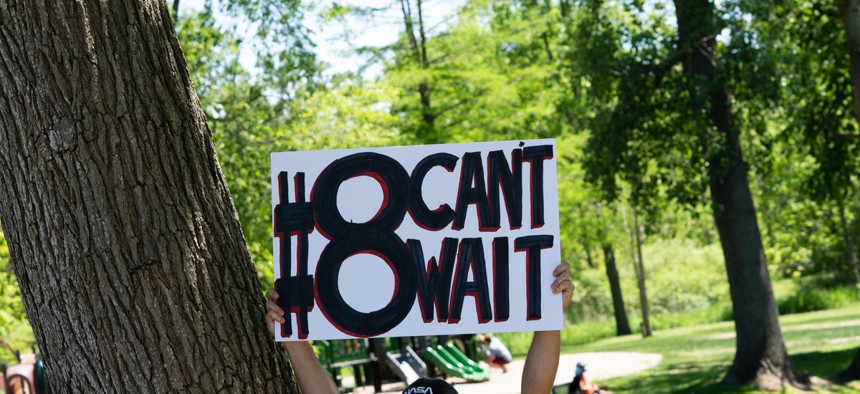Cities Respond to ‘8 Can’t Wait’ Campaign

A protester in Michigan holds up a sign for the #8CantWait campaign. Shutterstock

Connecting state and local government leaders
The campaign calls for police departments to make changes in how officers use force. Some activists say they aren’t enough.
Calls to remake how the police operate have resonated across the country as protesters continue to march on every major city in the country two weeks after the death of George Floyd.
One particular campaign for reform caught the attention of city leaders and police chiefs from Charlotte to Los Angeles—it’s called 8 Can’t Wait, and it encourages cities to adopt eight policies that restrict police use of force.
The campaign, which features the hashtag #8CantWait, was started by Campaign Zero, an advocacy group that uses data science to track police accountability and make policy suggestions to end police brutality.
The eight steps local leaders are encouraged to take are: ban chokeholds and strangleholds, require police to use de-escalation strategies, require warnings before firing a weapon, require officers to exhaust all options before shooting, require police to intervene when they see others using excessive force, ban shooting at moving vehicles, create a use-of-force continuum with restrictions for each police weapon and tactic, and require officers to report any time they use force or threaten to use force against a civilian.
The reforms have been readily embraced by officials across the country. Some city councils have passed symbolic resolutions calling on mayors and police chiefs to take action. In other places, mayors have taken it upon themselves and signed a pledge circulated by former President Obama that asks city leaders to evaluate their use-of-force policies. Some mayors, like Rick Kriseman of St. Petersburg, Florida, said that their departments already have more than half the reforms in place, but they will work to implement the rest. “We're doing it all because #8CantWait and justice can't wait,” he said on Twitter.
When Mayor Bill Peduto of Pittsburgh announced his intent to implement the 8 Can’t Wait policies, along with other changes to policing in the city, he faced immediate pushback from Pat Knepp, the vice president of the Pittsburgh Fraternal Order of Police, who wrote to the mayor about his concerns. “The reforms they announced have been implemented in the Pittsburgh Police since 2015! I was one of the people on the curriculum committee,” he said. “How do you stand and announce initiatives already in place?”
According to 8 Can’t Wait data, the Pittsburgh police have implemented four of the eight reforms.
The 8 Can’t Wait proposal has not just faced pushback from police in some cities, but also from other activists who say that the data is faulty and the reforms are weak.
Originally, 8 Can’t Wait organizers said that these policies, if enacted together, could reduce police killings by 72%. The claim is based on a 2016 comparative analysis of data from different police departments across the U.S., some of which had the reforms and some of which did not. Some policy researchers and data scientists said the model is methodologically questionable and extrapolates too much from a limited data set. Cherrell Brown, a community organizer, and Philip V. McHarris, a PhD candidate at Yale, penned an open letter asking the organizers to recall the campaign or temper their assertions about the effectiveness of the reforms.
“The study makes a massive claim—that the policies will reduce police killings by 72%—despite only being based on 18 months of data and only 91 police departments. That is not enough of a time frame to even approach any real semblance of causality,” the two wrote. “Many departments have already implemented these policies and it has not reduced the likelihood of police violence.”
Other activists pointed out that these policies are already in place in many police departments and have not made an impact on rates of police violence. San Francisco, for example, has enacted every one of the policies, but received an F on Campaign Zero’s Police Scorecard, which grades departments on use of force and civilian complaints, among other things. In Chicago, which similarly already has all the reforms in place, Mayor Lori Lightfoot said that “we know there is more work to do.”
Organizers say that the tide of public opinion about police brutality and subsequent reforms has shifted significantly in recent weeks, and now is the time to pressure city leaders for more sweeping reforms that take aim at police budgets.
The 8 Can’t Wait organizers publicly responded to criticism in several statements published this week. “While we are proud of the impact we were able to make, we at Campaign Zero acknowledge that, even with the best of intentions, the [8 Can’t Wait] campaign unintentionally detracted from efforts of fellow organizers invested in paradigmatic shifts that are newly possible in this moment. For this we apologize wholeheartedly, and without reservation,” the group’s website reads. “While we do not consider these adoptions a sole victory, we believe that they are useful steps on the path towards a collective goal.”
Campaign Zero is still encouraging policymakers to adopt the eight reforms, but asked them to “know that it will take many strategies to move beyond policing.”
Emma Coleman is the assistant editor for Route Fifty.

NEXT STORY: Cities Have Changed—For Rats





